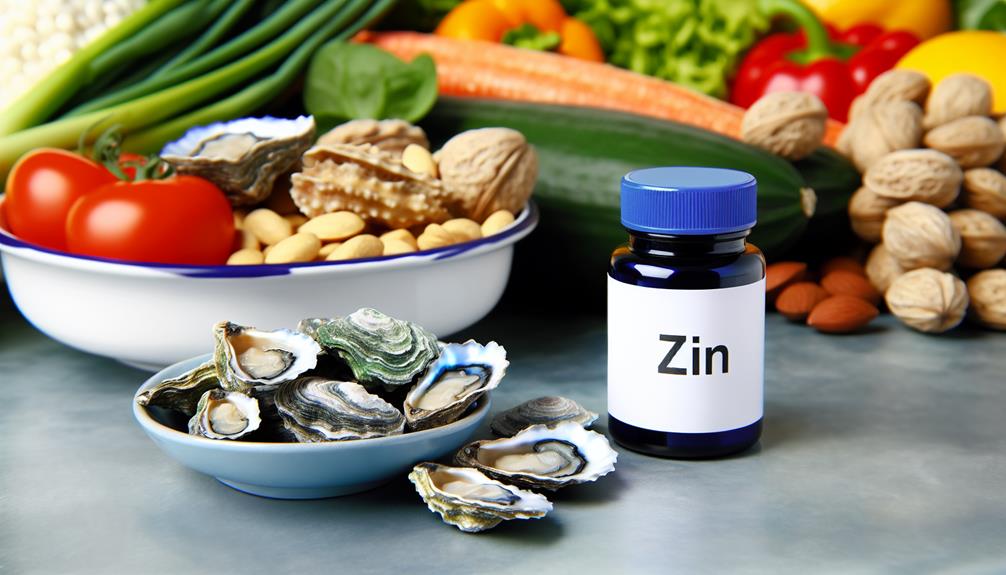When it comes to men's hormone health supplements, I find several ingredients truly essential. Zinc is vital for testosterone production and hormone balance. Vitamin D boosts testosterone levels and can be gained naturally from sunlight. Ashwagandha is fantastic for stress reduction, promoting hormonal equilibrium. D-Aspartic Acid plays a significant role in fertility and reproductive health by supporting testosterone levels. Finally, Omega-3 fatty acids help regulate hormones and reduce inflammation. Including these ingredients in your regimen can enhance overall well-being. If you're curious about their specific benefits, there's much more to uncover.
Zinc and Testosterone Production

When it comes to men's hormone health, zinc plays an essential role in testosterone production. I've always been fascinated by how our bodies work, and when I learned about zinc's impact on testosterone levels, it really opened my eyes. Zinc isn't just a mineral; it's a vital nutrient that helps maintain healthy hormone balance.
You see, zinc deficiency can lead to a significant drop in testosterone levels. I've read studies that show men with low zinc intake often experience symptoms like fatigue, decreased libido, and even mood swings. It's alarming how something so simple can have such a profound effect on our overall well-being.
Incorporating zinc into your diet can be straightforward. Foods like oysters, red meat, poultry, beans, nuts, and whole grains are excellent sources. I make it a point to include these foods regularly, knowing that they can help support my testosterone production.
If you're concerned about your zinc levels, it might be worth considering a supplement as well. However, it's vital to approach supplementation wisely. Too much zinc can also lead to negative effects, including interference with the absorption of other essential minerals.
Vitamin D's Role in Hormone Health
Although many people think of vitamin D as simply a nutrient for bone health, its role in hormone health is equally essential. I've come to appreciate how vitamin D can meaningfully impact testosterone levels, mood regulation, and overall hormonal balance. It's fascinating to learn that adequate levels of vitamin D can lead to increased testosterone production, which is vital for men's health.
When I first started exploring vitamin D, I was surprised to find how easily it can be incorporated into my routine. There are various vitamin D sources, and I've found that both sunlight exposure and certain foods can help me maintain ideal levels. Below is a simple table that outlines some key vitamin D sources and their benefits:
| Vitamin D Source | Benefits | Recommended Intake |
|---|---|---|
| Sunlight | Natural production of vitamin D | 15-30 minutes daily |
| Fatty Fish | Increases testosterone levels | 2 servings/week |
| Fortified Foods | Supports overall hormone health | Check labels |
| Supplements | Convenient for those with low levels | As directed |
Incorporating these vitamin D sources into my diet has not only improved my hormone health but also enhanced my overall well-being. So, if you haven't already, consider adding vitamin D to your supplement regimen or dietary choices. It's a simple step that can yield meaningful vitamin D benefits for your hormone health.
Ashwagandha for Stress Reduction

Maintaining balanced hormone levels is about more than just vitamins; managing stress is also key. One of the most powerful allies I've discovered in this journey is ashwagandha. This adaptogenic herb, often used in Ayurvedic medicine, has gained popularity for its remarkable ashwagandha benefits, particularly for stress management.
When I first learned about ashwagandha, I was intrigued by its ability to help the body adapt to stress. Research shows that it can lower cortisol levels, the hormone responsible for stress. By keeping cortisol in check, ashwagandha can help restore balance to my hormones, which is essential for overall health. I've found that incorporating it into my routine has made a noticeable difference in how I handle daily stressors.
What I love about ashwagandha is that it's not just about reducing stress; it also promotes mental clarity and focus. I've experienced improved concentration and a sense of calm, which allows me to tackle challenges more effectively. Plus, it's a natural option without the side effects that come with many synthetic stress relievers.
If you're considering adding ashwagandha to your regimen for hormone health, I'd recommend starting with a quality supplement and consulting with a healthcare professional. It's been a game-changer for me, and I believe it could be beneficial for you too. With ashwagandha, managing stress and supporting hormone balance can be a more achievable goal.
D-Aspartic Acid and Fertility
Exploring the benefits of D-aspartic acid has been a fascinating journey, especially when it comes to its role in fertility. As I dug deeper, I discovered how this amino acid might play a significant role in fertility enhancement for men. D-aspartic acid appears to boost testosterone levels, which can be essential for ideal reproductive health.
Here are some intriguing aspects of D-aspartic acid and fertility:
- Hormonal Balance: It helps regulate hormones essential for sperm production.
- Increased Testosterone: Higher testosterone levels can lead to improved libido and reproductive function.
- Sperm Quality: Studies suggest it may enhance sperm quality and motility.
- Fertility Potential: Some research indicates a direct link between D-aspartic acid supplementation and increased fertility potential.
- Natural Sources: Found in foods like meat, eggs, and dairy, it's accessible for those looking to boost their intake naturally.
From my perspective, incorporating D-aspartic acid could be a game-changer for men seeking fertility enhancement. While individual results can vary, the science behind its role in hormone regulation and reproductive health is compelling. If you're considering supplements, it might be wise to consult a healthcare professional to tailor an approach that fits your specific needs. By understanding the benefits of D-aspartic acid, we can take proactive steps towards better reproductive health and overall wellness.
Omega-3 Fatty Acids Benefits

After evaluating the benefits of D-aspartic acid for fertility, it's important to also look at how Omega-3 fatty acids can contribute to overall health and hormone balance. I've found that incorporating Omega-3s into my diet has made a noticeable difference in my well-being. These essential fats play a vital role in regulating hormones, reducing inflammation, and supporting cardiovascular health.
Omega-3 fatty acids primarily come from two sources: fish and plant-based options. Fatty fish like salmon, mackerel, and sardines are rich in EPA and DHA, the most beneficial forms of Omega-3. If you're not a fan of fish, flaxseeds, chia seeds, and walnuts are excellent plant-based omega 3 sources. They contain ALA, which our bodies can convert to EPA and DHA, although not as efficiently.
When it comes to Omega-3 dosage, studies suggest aiming for at least 250-500 mg of combined EPA and DHA daily for general health benefits. However, if you're targeting specific health issues or looking to enhance hormone balance, higher doses may be necessary. Always consult with a healthcare professional before making significant changes to your supplement regimen.
Incorporating Omega-3 fatty acids into my daily routine has not only improved my mood but also helped maintain my hormonal balance. It's a simple yet effective way to enhance overall well-being, making it an essential ingredient to examine in men's hormone health supplements.
Frequently Asked Questions
Are There Any Side Effects of Taking Hormone Health Supplements?
When I think about taking hormone health supplements, I can't ignore the potential risks involved. Some users may experience side effects like mood swings, weight gain, or sleep disturbances. It's vital to contemplate the long-term effects, as prolonged use might lead to more serious health concerns. I always recommend consulting a healthcare professional before starting any supplement to weigh the benefits against these risks, ensuring a safe approach to hormone health.
How Long Does It Take to See Results From These Supplements?
Imagine planting a seed; it takes time and care for it to blossom. Similarly, when I started taking hormone health supplements, I learned the expected timeline for results can vary. While some might notice changes in a few weeks, others may take months due to individual variations in body chemistry and lifestyle. Patience and consistency are key, just like nurturing that seed until it finally blooms into something beautiful.
Can Diet Alone Support Men's Hormone Health?
I've found that while diet alone can support men's hormone health, it often isn't enough. Incorporating dietary sources like lean proteins, healthy fats, and whole grains can make a significant difference. However, I think it's important to contemplate natural alternatives too, like herbs and supplements, to optimize results. Balancing a nutritious diet with the right support can help maintain hormone levels effectively, so I've made it a priority in my health journey.
Is It Safe to Combine Multiple Hormone Supplements?
I often wonder about the safety of combining multiple hormone supplements. It's essential to take into account combination safety, as different supplements can interact in ways we might not expect. I've learned that some ingredients can enhance each other's effects, while others may cause unwanted side effects. Before diving into multiple supplements, I always recommend consulting a healthcare professional to understand potential supplement interactions and guarantee I'm making the safest choices for my hormone health.
Who Should Avoid Using Hormone Health Supplements?
When I think about hormone health supplements, I can't help but feel a mix of hope and caution. It's essential to take into account age and medical conditions before diving in. Younger individuals or those with underlying health issues, like heart disease or diabetes, should avoid these supplements unless advised by a doctor. Hormone balance is delicate, and the wrong approach can lead to more harm than good. Always prioritize safety and consult a healthcare professional first.
